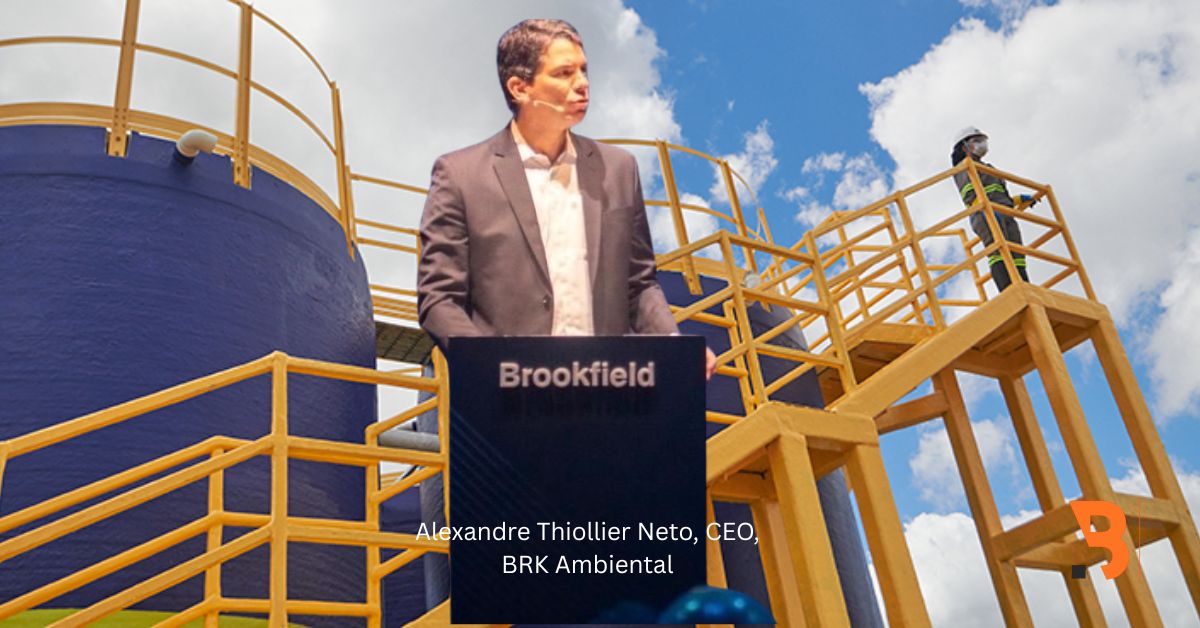Energy and Infrastructure
Leading Sanitation Forward: BRK Ambiental CEO Alexandre Thiollier Neto Takes Permanent Role in Brazil’s Critical Road to Universal Sewage Coverage
BRK Ambiental CEO Alexandre Thiollier Neto takes permanent role, linking investment discipline with social impact as Brazil pushes for universal sanitation and clean water access

BRK Ambiental CEO Alexandre Thiollier Neto has been named permanent head of the company, moving from Managing Partner at Brookfield’s Private Equity and interim CEO of BRK. His appointment marks a milestone in Brazil’s effort to close one of its most persistent infrastructure gaps: sanitation. Approximately 100 million Brazilians still live without adequate sewage services, and 30 million lack reliable access to clean water. Thiollier’s leadership in BRK Ambiental — backed by Brookfield and FI-FGTS — comes as regulation, private investment, and international finance align to push the sector forward.
BRK Ambiental CEO and the state of sanitation in Brazil
Brazil has advanced since the 1990s, but coverage remains uneven. The most recent census indicates between fifty and sixty percent of homes are connected to sewage networks, leaving many with precarious or no service. Water access has improved, but millions still rely on informal solutions or face irregular supply. The 2020 sanitation law set ambitious targets for near-universal access by 2033 — a deadline now less than a decade away.
Investment landscape and BRK Ambiental leadership
Historically, sanitation lagged other infrastructure. State-owned utilities dominated, often without resources to expand at scale. Private concessions opened the sector, and Brookfield’s acquisition of Odebrecht Ambiental in 2017 — creating BRK — was a watershed moment.
Investment has accelerated since 2020, supported by federal and state programs, yet analysts warn Brazil still invests only about half of what is required annually to meet 2033 goals. Development banks and international financiers are filling part of the gap. In Maranhão, for example, long-term financing from multilaterals is extending BRK’s network to hundreds of thousands of residents.
The appointment of Thiollier Neto as BRK Ambiental CEO may also signal a shift in how the company positions itself. His background in private equity suggests a readiness to adopt a more competitive posture and ability to raise capital domestically and internationally for sanitation.
Competitors and investment groups in sanitation
BRK operates in a contested arena shaped by incumbents and private challengers:
- Sabesp (São Paulo): the largest utility, with a multi-year plan designed to maintain leadership amid national targets.
- Sanepar (Paraná): state ownership combined with private partnerships (e.g., Acciona) to reach dozens of municipalities.
- Copasa (Minas Gerais): scaling programs to keep pace with peers.
- Aegea Saneamento: frequent winner in concession auctions, backed by sovereign and pension funds.
- Iguá Saneamento: private-equity-backed; recently secured a major Sergipe concession.
- Pátria Investimentos: infrastructure funds and SPVs targeting sanitation as a long-duration asset class.
- International financiers (IFC, IDB Invest, Proparco) fund both state incumbents and private firms such as Thiollier Neto BRK, bringing long-tenor capital and development mandates.
Why this move matters for BRK CEO Thiollier Neto
Thiollier Neto steps into the role as BRK Ambiental CEO with scale and timing. BRK already serves well over fifteen million people nationwide, giving it leverage to influence outcomes. His private-equity background signals governance rigor and capital discipline — tools that can turn regulatory ambition into operational delivery. Financing remains the central test: extending networks to poorer, remote areas is expensive, but blended structures show public, private, and international investors can share risk. Innovation — modular systems and decentralized treatment — will also be required.
Challenges ahead for BRK Ambiental CEO
Costs in low-density regions are high. Regulatory processes vary across states and municipalities, slowing projects. Tariff design must balance sustainability with affordability. Technical demands in treatment, water quality, and climate resilience add complexity. As Alexandre Thiollier Neto grows BRK’s footprint, managing contracts, supply chains, and community relations becomes more demanding.
Social initiatives: Fonte de Futuro
Alongside concessions and financing, Thiollier has tied BRK Ambiental leadership to visible social-impact programs. The flagship is Fonte de Futuro, created by Instituto BRK with Zurich Seguros and municipalities. It equips rural public schools with treatment systems that guarantee potable water — still missing in almost forty thousand of Brazilian classrooms.
Fonte de Futuro has already reached schools in Tocantins and other states, benefiting students, teachers, and families with technology that eliminates pathogens and with environmental education that anchors new habits. Designed for replication, Fonte de Futuro is set to scale nationwide, potentially benefiting hundreds of thousands of children and their families.
The Firms Behind the Deal
When Brookfield acquired Odebrecht Ambiental in 2017 — creating what is now BRK Ambiental — Brookfield and its consortium, later joined by Sumitomo, relied on Debevoise & Plimpton LLP in New York and TozziniFreire Advogados in São Paulo. On the seller’s side, Odebrecht S.A. was represented by Mattos Filho, Veiga Filho, Marrey Jr. e Quiroga Advogados. While financial advisors were not disclosed, these legal teams built the framework that enabled BRK Ambiental CEO leadership to operate at national scale.
Debevoise & Plimpton LLP is very active in several countries in Latin America including Brazil.
Conclusion: BRK Ambiental CEO and Brazil’s sanitation turning point
Thiollier Neto’s permanent role underscores Brazil’s determination to close one of its most pressing infrastructure gaps. If regulatory reform, private capital, and executive leadership align, Brazil can finally deliver universal sanitation. For BYL readers, this is not merely a corporate story — it is about the foundations of development, public health, and equity in Latin America’s largest market.
Related Reading
- Brazil August 2025 Deals Recap — key venture and M&A highlights, including infrastructure and utilities.
Resumo em português
O BRK Ambiental CEO Alexandre Thiollier Neto assume de forma permanente, unindo disciplina de investimento e impacto social enquanto o Brasil busca avançar rumo à universalização do saneamento e do acesso à água potável.

















